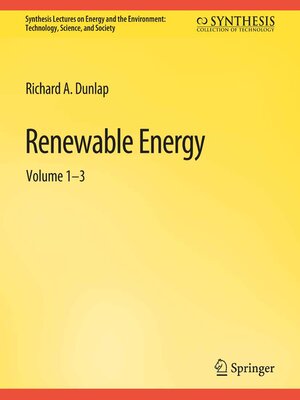Renewable Energy
ebook ∣ Volumes 1 – 3 · Synthesis Lectures on Renewable Energy Technologies
By Richard A Dunlap

Sign up to save your library
With an OverDrive account, you can save your favorite libraries for at-a-glance information about availability. Find out more about OverDrive accounts.
Find this title in Libby, the library reading app by OverDrive.



Search for a digital library with this title
Title found at these libraries:
| Loading... |
This volume considers various methods of energy storage that make use of electrochemical reactions, electric and magnetic fields, and chemical reactions. This book begins with a consideration of the use of batteries as a means of storing electrical energy. Various common battery chemistries are presented along with a summary of common battery sizes. The electrochemistry of a lithium-ion (Li-ion) cell is discussed in detail. Sodium-based batteries are discussed, as are vanadium flow batteries. The applications of batteries for energy storage are overviewed, concentrating on transportation technologies and grid-scale storage. Methods for storing energy in the form of electric fields include the use of supercapacitors and superconducting coils. The design of capacitors, including supercapacitors, pseudocapacitors, and hybrid capacitors is presented. The applications of supercapacitors for high-power, short-term energy storage are discussed. The use of superconducting magnets to store large amounts of electrical energy without resistive loss is presented. The application of superconducting electrical storage for grid stability is considered. Final chemical energy storage techniques are considered. The use of hydrogen as an energy carrier is discussed in detail. The concept of a future hydrogen economy has been popular in recent years. This volume considers the efficiency of such an approach. Other chemical energy carriers, such as methane, methanol, and ammonia, are discussed.






